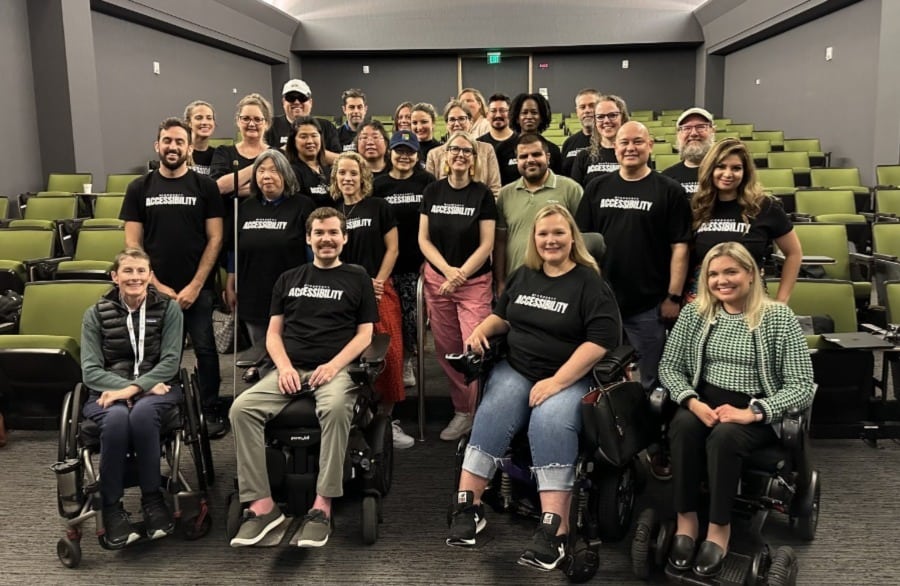Microsoft leverages power of AI to improve accessibility for disabled people

To coincide with the 12th annual Global Accessibility Awareness Day (GAAD), Microsoft has launched a number of new programmes and technologies to accelerate knowledge and use of accessibility around the world.
GAAD, which took place yesterday (18 May 2023), is designed to drive awareness and highlight advancements in accessible technology and the incredible work happening within the community to bridge the disability divide.
To mark this day, Microsoft revealed some of its latest advancements in AI, Microsoft Office, gaming, and people, with new skilling and non-profit partnerships, that are improving accessibility.
As part of this, Microsoft has recently expanded its Disability Answer Desk with CPT-4.
The firm has a long-standing partnership with BeMyEyes, a smartphone app for blind and low-vision users. BeMyEyes has expanded its AI capabilities, with the support of OpenAI, by introducing a Virtual Volunteer that can provide 500 million of its users with detailed AI-generated descriptions of the world without needing a sighted person.
Since Microsoft began its partnership with Disability Answer Desk (DAD) and BeMyEyes in 2017, it says that users have told Microsoft that calling DAD via BeMyEyes resolves issues quickly (resolved 95 percent of the time) and with great results (user satisfaction rating of 4.5 out of 5).
Now, Microsoft is further enhancing user support by announcing a new pilot programme to add GPT-4-powered functionality to DAD. Microsoft hopes to provide users with faster service, independent resolution, and learnings on the power of gen-AI for people with disabilities.
In addition, Microsoft Office has had an accessibility upgrade. Microsoft asked IT administrators how it can better serve them to create more inclusive workspaces via its products and services. Based on their feedback, Microsoft has launched Accessibility Baseline, which is an update to Microsoft 365 Apps Admin Center and Cloud Policy.
Administrators can now enable accessible document creation for M365, and new improved Accessibility ribbon for Mac and PC, enhanced Narrator support for Excel, and accessibility checking tools built into Office, which continues to make accessibility more discoverable and easier to use.
Accessibility in the workplace and empowering and upskilling disabled people has also been a focus for Microsoft. On GAAD, Microsoft and LinkedIn launched new tools and resources to pave a more accessible pipeline for talent, including for people with disabilities, managers, and allies.
The new tools include:
- Blind/low vision access on LinkedIn: LinkedIn’s popular Professional Soft Skills Learning Pathway is now available with audio descriptions. It is a 12-course learning pathway to help job seekers improve their skills for in-demand jobs. Also, based on feedback from blind users, alternative text (alt text) character count has increased from 300 to 1,000 on LinkedIn.com with new screen reader support articles in the Help Center.
- Free LinkedIn learning for leaders and managers: Making the Case for Accessibility in Your Organization for leaders with disabilities and allies get started on accessibility journey. Disability Readiness for Leaders and Managers focuses on empowering managers to be more inclusive to disabled talent.
- The Neurodiversity @ Work Roundtable’s Playbook: Employee Engagement & Growth Series include new playbooks detailing five employers learnings on work to create neuroinclusive culture.
Microsoft Accessibility Training includes pointers to these new resources.
Also for GAAD, Microsoft unveiled the 2023 Microsoft Accessibility Nonprofit Tech Accelerator (NTA) grantees. Each non-profit grantee advances accessibility, disability rights, and inclusion around the world.
One example is the Tech for Independent Communication project, a joint effort between African Health Innovation Centre and Ghana National Association of the Deaf, which aim to create an accessible video-based survey system for collating feedback from deaf students in Ghana.
Microsoft has further revealed that 18,000 Xbox Ambassadors (Microsoft owns Xbox) have collectively completed over one million Accessibility Explorer Path missions. Like ItsMileyGirl, a fierce advocate for accessibility after learning about features available and why they are important to users with disabilities.
At Microsoft’s 13th Ability Summit earlier this year, it unveiled that it is expanding its 3D printed grips for pens for people with reduced mobility, launching a tool to help creators produce more inclusive content, and making its screen reader interact seamlessly with accessible accessories.

